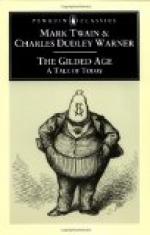One thing annoyed Harry a great deal; and that was the reflection that he might have been in Washington days and days ago and thrown his fascinations about Laura with permanent effect while she was new and strange to the capital, instead of dawdling in Philadelphia to no purpose. He feared he had “missed a trick,” as he expressed it.
He only found one little opportunity of speaking again with Laura before the evening’s festivities ended, and then, for the first time in years, his airy self-complacency failed him, his tongue’s easy confidence forsook it in a great measure, and he was conscious of an unheroic timidity. He was glad to get away and find a place where he could despise himself in private and try to grow his clipped plumes again.
When Laura reached home she was tired but exultant, and Senator Dilworthy was pleased and satisfied. He called Laura “my daughter,” next morning, and gave her some “pin money,” as he termed it, and she sent a hundred and fifty dollars of it to her mother and loaned a trifle to Col. Sellers. Then the Senator had a long private conference with Laura, and unfolded certain plans of his for the good of the country, and religion, and the poor, and temperance, and showed her how she could assist him in developing these worthy and noble enterprises.
CHAPTER XXXIII.
Laura soon discovered that there were three distinct aristocracies in Washington. One of these, (nick-named the Antiques,) consisted of cultivated, high-bred old families who looked back with pride upon an ancestry that had been always great in the nation’s councils and its wars from the birth of the republic downward. Into this select circle it was difficult to gain admission. No. 2 was the aristocracy of the middle ground—of which, more anon. No. 3 lay beyond; of it we will say a word here. We will call it the Aristocracy of the Parvenus—as, indeed, the general public did. Official position, no matter how obtained, entitled a man to a place in it, and carried his family with him, no matter whence they sprang. Great wealth gave a man a still higher and nobler place in it than did official position. If this wealth had been acquired by conspicuous ingenuity, with just a pleasant little spice of illegality about it, all the better. This aristocracy was “fast,” and not averse to ostentation.
The aristocracy of the Antiques ignored the aristocracy of the Parvenus; the Parvenus laughed at the Antiques, (and secretly envied them.)
There were certain important “society” customs which one in Laura’s position needed to understand. For instance, when a lady of any prominence comes to one of our cities and takes up her residence, all the ladies of her grade favor her in turn with an initial call, giving their cards to the servant at the door by way of introduction. They come singly, sometimes; sometimes in couples; and always in elaborate full dress. They talk




